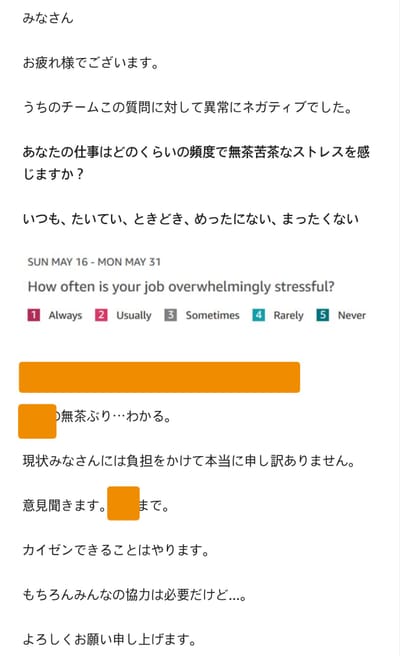Lessons learned during my 2 years of work at Amazon Warehouse in Kyoto

I came to Japan mainly to be with my now wife, then girlfriend in 2020 March.
Since it was about time for me to stop bothering my parents at age of 25, I job hunted for half a year during my last year at uni In 2019 and landed on a few offers in Japan.
Amazon Japan was one of the last companies I interviewed, and despite the fact I had several other offers I chose Amazon for its BIG name, competitive salary and also for my love of their Audible services.(which had nothing to do with my position as a area manager in amazon warehouse but still)
In summer of 2019, after signing the offer from Amazon, I felt like I had it all figured out. The thought went like
“After having tons of fun during university+2 years of GAP, now I can be with my girlfriend while working at a prestigious company!”
In addition to that there was half-year of free time ahead of me, and amazon’s relocation fee not only covered my move to Japan but also enough to travel extensively to Thailand, Uzbekistan and Vietnam before starting to work in 2020 March.
However, life didn't go quite as a naive university student in Korea have guessed.
Reality check
‘Sorry, we canceled all our training plans for now. Go report to your manager and they will come up with training for you.’
COVID 19 has hit, and all the group offline training that was planned for all new graduate joiners has been canceled.
Also, in the face of COVID 19, Amazon has chose to install plastic walls between working stations EVERY where. Which the staff had to actually measure and cut with a stationary cutter.
People some times say ‘hands-on’ experience, but my experience in amazon especially during the first few months, had lots of ‘knees-on’ as well. Trying to stick a 2,3 meter length tape in straight line over and over again.(They check corners with triangle square rulers)

Supposed to be manager from the very start?
Amazon hires graduates in operations as a L40 manager, which means you often find yourself at a role where a handful of people are directly reporting to you. Although there is some lead time before you start having people directly reporting to you, that happens within 6-9 month time frame after your first day.
Often than not, the people who report to you have more work experience, much older, and not TOO elated about the fact that their manager is a new fish just out of uni.
I knew the above as a matter of fact after reading many reddit threads of US amazon associates’ complaints about having to train their new graduate managers. Also, it is well known job to be TOUGH.
Some comments/posts from reddit related to Amazon AM positions.



However, knowing something and experiencing something turned out to be two VERY different things.
Nobody respected me for having the title of a manager. I had to earn every ounce of trust and respect by devoting myself to work and to the people. It took time, sweat and lots of sleepless nights until I felt somewhat comfortable about the fact that there are people who are reporting to me.
Fighting for that respect from associates and building from there
That discrepancy between where myself and the company expected myself to be as a manager and the reality that I am just out of uni and don't know much anything about the job I have to manage had to be closed.
I was not given a great responsibility in one of the major proejcts during my first year. (this, turned out to be very wise decision of the management despite my yearning for important work from very start) However, after my 7-8 months of expereience I have been assigned a responsibility of maintaining all the boxes and wrappings that are used in the warehouse.
This work was considered something necessary but not important. There had to be someone looking aftert it yes, but the best that can come out of it was 'you don't run out of a specific box during operations'.
I learned how many types of boxes that the warehouse uses and where they are located, How the staff ordered a new pallette of boxes before anything ran-out. There were trained staff to make orders by physically doing rounds to check how many boxes are left and I just had to change the number of palletes per box per floor based on staff requests at times.
The situation took a big turn when our warehouse was requested to more than 2x the type of boxes being used within the warehouse. Making space for all the new stuff at a logical location was one-thing, but the real problem was that our previous workflow that we had did not function with the increased number of box types.
We kept on running out of several boxes every night when it is not possible to order a new pallette. Only option was to request near by warehouses to send over some or pack goods in different size boxes which would result in lower quality scores for our facility.
A rather boring task, that was overlooked by most people suddenly became a bottleneck of daily operations. We had to change the workflow.
I first looked at how things are as it is.
-Staff took a round of the whole facility every 1-2 hours.
-Located empty spots and checked which boxes to order
-Made orders based on the check done during rounds
-Repeat above several times throughout the day-shift
An ideal model would be having a real-time count of all boxes’ within the facility and auto-fill necessary orders by calculating the number used. This was technically possible but in reality we had other factors that we had to consider.
-At the end of the day we needed to have buffer for the whole night shift.
-We also needed enough buffers to be there throughout the day since there could be sudden bursts of order trend that leads to sudden hikes of specific box type usage.
-Each floor should have enough of all box types so that we save unnecessary cost of moving boxes between floors
And on and on and on.
It was frustrating that we had quality issues on a daily basis and I was responsible for it. However it was liberating that the upper management did not care much how I fixed it. I had room to problem solve this myself.
Here are a list of things that I have placed to fix the problem.
-Located where we can get real-time data of how many of boxes were spent.
-Made a tool that can make Forecast of how many of what boxes will be used based on 3-day and last week trend.
-Made a regular review process of overall facility box space based on the usage trends.
In the end the staff had a sheet of paper with the day’s forecast, which gave even the less experienced staff some room to strategize the orders throughout the day. Less rounds were needed to count everything. In addition to that the regular review process prevented large scale deficit issues.
Adult lesson 101, how people really get promoted
Despite the hardships of having to manage people, the experience of being a manager was a good lesson for me. Especially in understanding how corporates work and behave.
One of the most reward part of being a manager is when your direct reports get a promotion. Promotions were quite a common thing in Amazon japan where they were ever expanding and there were always regular promotions every year.
The interesting part is the process of choosing who is the one getting the promotion.
Amazon has loads and loads of data. However, even with the loads of data there is no objective number to specify a staff performance. There are many many different aspect of a person’s performance.
What if the candidates are doing quite different work within the division? What if person A’s performance seems to be slightly better but person B has been waiting in line for promotion for 2-3 years at this point? What if higher management had KPIs to hire/promote more female staff?
Adding a layer of complication, Amazon warehouse usually gets the Head count for promotions as a whole warehouse rather than each division. Hence, each division has to compete for that limited headcount.
Back stage decisions have to be made in advance. How many head count will our division fight for this round? If there are only 1 slot, which of our candidates are easier to ‘sell’ to other divisions?
It was a mesmerizing and demystifying thing to witness. As a student I used to think quite simply. In the adult/corporate world, high performers get promoted and advance their career. However the devils were in the detail as they say. How would you define high performer where it often cannot be objectively sorted out. The best person for the job should be the one, but who can say for sure that this person is the BEST.
There are of course exceptional people, who need not so much of a explanation to advance. Who shine like a star and every one has but to just nod with approvals when the person is promoted.
However, in many cases it is not so evident.
Importance of having Sponsors
When cards are laid out on the table and overall seems quite even, what becomes game changer is a small push from sponsors. A sponsor can be a manager in a different division, A manager’s manager or even HR.
That person who would give you a good name when the playing field is overall even.
Sponsor can be won by your good daily actions but much easier when you actually put some intention in making someone your sponsor.
The full video is also very much worth watching!
There are chacnes where you get to collaborate with other divisions on small matters. Be proactive in raising your hand and give yourself a good-name in the other division. That might lead to the small-push you need later on.
Self PR is not an option, It is a must
Oh, I have worked so hard and my manager does not acknowledge that! I have heard this over and over and over. I often hear this now at a totally different company which is in a different industry.
The thing is, the manager might really just not know. Could be too much work, some personal issue, or just lack of interest.
The reason behind is not too important. The fact that your manager has to go into a room one day and have to talk about your ‘performance’ is what matters.
Let the manager know of all your good deeds. From small to big, summarize it in a PDF file or make a one pager. Add proofs or feedbacks from other managers to enhance credibility. Just make sure that your manager has a go to sheet where your good deeds are organized in a presentable way. Make it so easy for the manager to vouch for you than lament your manager’s lack of attention to detail.
Document and share as much as possible
As the rate of change was quite hectic in Amazon, there were many work processes that some people just owned in their own. In some cases people who felt vulnerable wanted to keep some processes private since they thought this gives them an edge. Apparently this behavior is not limited to Amazon only since I have heard many cases in different companies where vulnerable people kept work to themself only and became single point of failure.
My experience at Amazon was more people were just too busy to document things. Nevertheless, it was very frustrating when work was handed over and the only handover support I got is just a clumsy explanation of the process.
This frustration led me to document and log on internal wiki pages as much as possible about the responsibilities I had. By doing this I was able to hand-over smoothly when this responsibility had to be transferred to someone-else.
This not only benefitted the receiving-end but also benefitted me as well.
- It took much less time to handover.
- The time needed to organize what I did to share with my manager and them to their upper management was shortened.
- By documenting on a public space it was quality control factor in itself.
Working in shifts can be tougher than you might think
My work as area manager had to be in shifts since the warehouse ran 24/7. I had the following 3 shifts.
-early : 0900-1800
-late: 1300-2200
-night: 2200-0700
I didn’t think too much about this when I first started working but this really took a toll in my health and relationships.
Most social scenes happen during evenings. Especially throughout Friday to Saturday. Having shifts that changed quite often made me someone difficult to reach out to at regular hours. It made it much harder to plan fun stuff with friends.
Final notes
Overall my 2 years at Amazon was tougher than what I thought both physically and mentally. Work and life balance was certainly not the priority. However, for me it was worth it.
I met many good friend and colleagues within the company 1/3 of my wedding guests were my dear friends I made at Amazon, and surprisingly the skills I picked up was well appreciated and applicable in a totally different industry and company. It was a great adventure to take part in what happens behind of the modern E-commerce logistic giant. Also, I have to mention that there were plethora of opportunities to move to non-warehouse positions within Amazon Japan.(Many of my ex colleagues whom I met in warehouse facilities are now in Tokyo office)





Member discussion